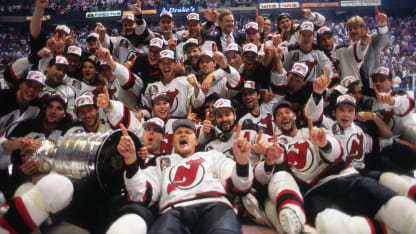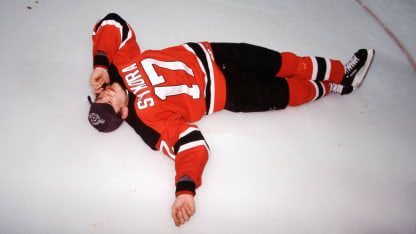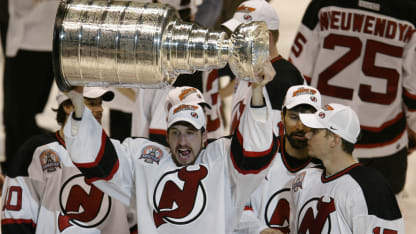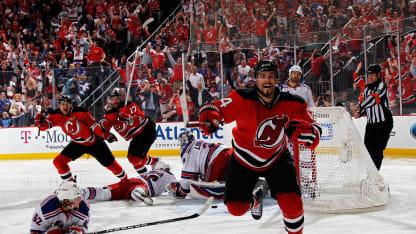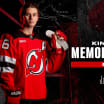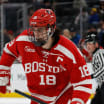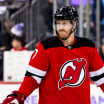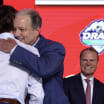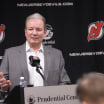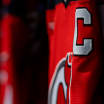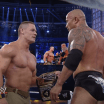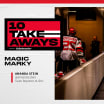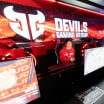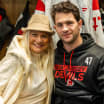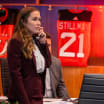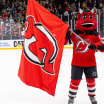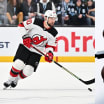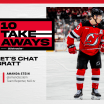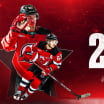3. The Stanley Cup Hat Trick
Game 7, Stanley Cup Final, June 9, 2003
William Shakespeare once wrote, "There is much virtue in if."
My Dad liked to say, "You can if 'til the cows come home."
Those of us who covered the 2001 Stanley Cup Final between the Devils and Colorado Avalanche left with an empty feeling after New Jersey was defeated in Game 7. Summing up it was a case of "Close but no cigar" and I'll leave it at that.
Yes, the music stopped but the melody lingered on while Lou Lamoriello scripted what he hoped would be one more championship scenario. "We all knew it wouldn't be easy," said the Major Domo. "We had been to the Final round three times and came away with two
Cups. Our plus was that we still had a core that had been there before and knew the score."
The chief protagonists included captain Scott Stevens, defensemen Scott Niedermayer and Ken Daneyko as well as forward Sergei Brylin. They brought the experience of the 1995 and 2000 championships as well as the heartbreak of 2001.
There also was a different face behind the bench. Gone were the calm and collected Jacques Lemaire along with Larry Robinson. This time an ex-cop would be running the show and Pat Burns was every bit the policeman making the decisions, scolding the laggards and pumping energy up and down the line.
"Pat was a great coach," said forward Jamie Langenbrunner, "an old-school coach. He just wanted us to go out and play hard. We had a system in place, but it was a pretty loose one. Pat just wanted us to focus on the fundamentals and work hard. If you did that he would
reward you with ice time."
The rewards were evident all season. Players accepted Burns; gruff, no-nonsense orchestration and the point was evident in the final standings. New Jersey wound up being Atlantic Division champions with 108 points. League-leading - Presidents' Trophy titlists Ottawa finished just five points in front of the Garden Staters.
"There was a lot to like about our club," added Langenbrunner, especially the balance but most of all we had Marty Brodeur in goal. No other team could make that statement."
Devil domination began in the first playoff round, a four games to one triumph over the Boston Bruins followed by another 4-1 series decision against the Tampa Bay Lightning. "The new guys Lou added all were fitting in," said Captain Stevens. "We couldn't have won without them."
One was Jeff Friesen, a fleet forward who fascinated some reporters with his unique way of tying his skate laces. Another was miniscule forward Brian Gionta from Rochester, New York, who fearlessly battled the likes of 6-8 Zdeno Chara game in and game out.
"Any ideas that the third round would be another cakewalk were quickly dispelled by league-leading Ottawa. The series extended a full seven games culminating at the Senators distant rink in suburban Kanata, Ontario.
To this day, I rank the finale as one of the most gripping I've ever covered. The 2-2 tie extended past the 17-minute mark of the third period. That's when crafty Scott Gomez steamrolled along the left side while Friesen cut down the middle.
As Jeff skated past Ottawa defenseman Wade Redden, Gomez delivered the pass and Friesen did the rest. And that's all she wrote.
The Cup Final was no less-heart-throbbing; a seven-game affair that was settled on June 9, 2003 in East Rutherford. It was a contest that inspired Rich Chere to declare: "The Devils' place among the greatest teams in NHL history is now secure."
Let me assure you; it did not come easy; far from it. The Mighty Ducks were ornery, tenacious and fortified with a goalkeeper named Jean-Sebastien Giguere who was formidable, to say the least.
Prior to Game 7, the final decision was impossible to predict. "We never thought Anaheim would get this far," recalled long-time Devils-watcher George Falkowski. "When it came down to Game 7, we believed the final decision would be a toss-up."
Confounding the forecasters was an enormous gamble taken by coach Burns. For the first six games of the tourney, the skipper had benched defenseman Ken Daneyko, the lifetime Devil. Now, Burns declared, Dano would be in the lineup for the Finale.
The "pro" argument was that Ken was fresh, super-motivated and experienced. The "con" was that it would be putting too much pressure on the grizzled vet.
"I knew that the crowd was behind me," Kenny allowed, "and I was thrilled at the opportunity."
Nor did Dano criticize his mentor. "He just kept the pedal to the metal all year long and didn't let us get complacent. He came in from Day 1 and was a no-nonsense guy. He did some things that sometimes you don't understand. I didn't understand him putting me back in the lineup. But he stayed focused throughout and he kept us focused."
One of Burns' controversial moves was his decision to use big Mike Rupp on the attack. Never known for his finesse nor scoring largesse, Rupp nevertheless was the coach's choice, and it would be decisive in only Mike's fourth career playoff contest.
The game was melodramatically scoreless into the second period when the turning point arrived just past the two-minute mark. Decisively, Scott Niedermayer prevented the puck from leaving the Visitor's zone. He then fired the rubber goalward in the direction of
Rupp who was camped at the slot.
The big guy lifted his stick and the puck obediently ricocheted through Giguere's pads and into the twine. Amazingly, the red light represented Rupp's first career playoff score and only his second point. The joint was jumping to be sure, but the biscuit had beaten
Giguere at 2:22 leaving a ton of hockey to be played.
"We were counting on Marty to hold the fort," said Larry Gaines, the MSG Networks tech expert. "There were just too many minutes left for anyone to get cocky."
But who should relieve the tension but young Rupp again - and in remarkably similar fashion to Goal 1. Niedermayer took the shot and Rupp deflected it; only this time their goalie got a piece of the puck.
But just a piece. When Giguere failed to control the rebound, the appetizing puck awaited a stick. Camped at the right hash marks, Friesen outreached Ducks defenseman Kurt Sauer and nudged the tablet behind the desperate goalie.
Jeff's celebratory stick pierced the air - his ninth goal of the postseason - at 12:18: 2-0 New Jersey.
The teams left the ice after the second period with New Jersey ahead by two but nobody - and I do mean nobody - felt that the game was in the bag. "The Ducks have too many sharpshooters for anyone to get overconfident," said MSG producer Roland Dratch. "Now, it was up to Marty to keep the door closed."
Brodeur remained flawless as the overhead clock ticked away the third period minutes. The capacity crowd wanted one more "security blanket red light" and it finally was illuminated at 16:16 of the closer by none other than "That Man," Friesen - his 10th of the playoffs.
As for Jeff, he allowed that his emotions broke loose as the final minute was elapsing. "I was about to live the dream I had since I was a kid," Friesen grinned. "I was about to sip champagne from my first Stanley Cup."
For the indomitable Brodeur, this third Cup lifted him up to a new plateau. His blank job in Game 7 tied him with Hall of Famers Johnny Bower of the Toronto Maple Leafs and Lorne (Gump) Worsley of the Rangers, Canadiens and North Stars, among the precious three goalies to shut out the opposition in a Game 7 of the Cup Final.
The only downer - and make no mistake, it was a downer - was the fact that losing goalie Gigeure was voted the Conn Smythe Trophy as the playoffs MVP. "I don't really care," laughed Brodeur, "I have The Stanley Cup."
And that's why 19,050 fans could not stop rocking Continental Airlines Arena, nor smiling their way home. Their New Jersey Devils had scored a rare Stanley Cup hat trick!

